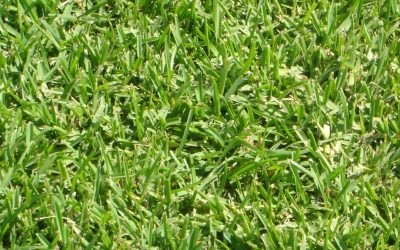How to Stop Dog Digging Up Lawn
Quick Links
8 Ways to Stop your Dog from Digging your Lawn
1. Stop your dog from digging by placing obstacles and digging deterrents.
2. Stop your dog from digging by creating a digging zone.
3. Stop your dog from digging by providing an outdoor shady play area.
4. Stop your dog from digging by controlling the rodent population.
5. Stop your dog from digging by providing mental and physical stimulation.
6. Stop your dog from digging by not allowing it to carry toys and treats outdoors.
7. Stop your dog from digging by imposing rewards and/or punishment.
8. Stop your dog from digging by using lawn installations.
Is Your Dog Digging Holes in Your Lawn?
You have a manicured lawn and a dog that you truly love. Everything seems perfect until your dog starts digging.
Dogs are natural-born diggers and that is why many dog owners find it challenging to stop their fur babies from digging holes within their lawns.
When your dog starts to dig, it makes unacceptable digging spots unattractive. An uncontrolled digging habit can destroy your yard and track dirt and mud into your house.
In worse situations, if your dog’s digging tunnels under a fence line to escape, it can be dangerous.
Many dogs dig for different reasons. Understanding why your dog digs holes is the first step to minimising this behaviour.
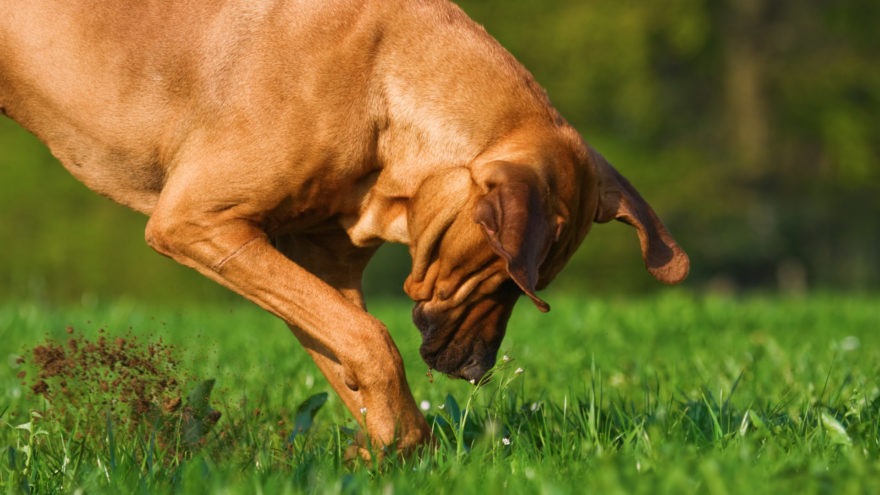
Why Do Dogs Dig?
Your dog’s digging problem is not uncommon. Many dogs also do it for various reasons.
Instinct
Dog digging holes is an instinctual behaviour among canines. All dogs dig holes to some extent as digging comes naturally to them as wagging their tails and barking.
Some dogs dig their beddings or cushions before lying down, while other dogs love to dig holes in the yard.
Searching for prey
Many dogs dig to hunt for prey such as rodents and other small animals that they can smell or hear underground. This is especially true for hunting dogs or those that were bred to hunt, such as dachshunds.
Comfort
During hot weather, some dogs dig holes in the dirt or in the yard to cool off. Siberian huskies and other dogs bred for colder weather are prone to this dog digging behaviour.
For fun
A bored or anxious dog loves digging as a way to distract itself. Some dogs especially those with separation anxiety and those often left alone dig to keep themselves busy.
If your dog starts digging uncontrollably because it’s either bored or anxious, you need to provide enough mental stimulation and physical activity to stop its behaviour. You could schedule more exercise and play to keep your best friend happy.
To burry treasure
If you notice chew toys and other toys starting to disappear at the same time your pet starts digging holes, there is only one possible reason for that – your dog may have buried them.
Some dogs also dig to hide food for later. Unfortunately, many dogs don’t remember where they hid their treasures which then results in more digging in your yard.
Escape to the other side
Escape dogs often leave the yard through underground tunnels and go to the other side of the fence. If your dogs are considered escape dogs, it’s normal to find holes in the same place, typically along your fence line.
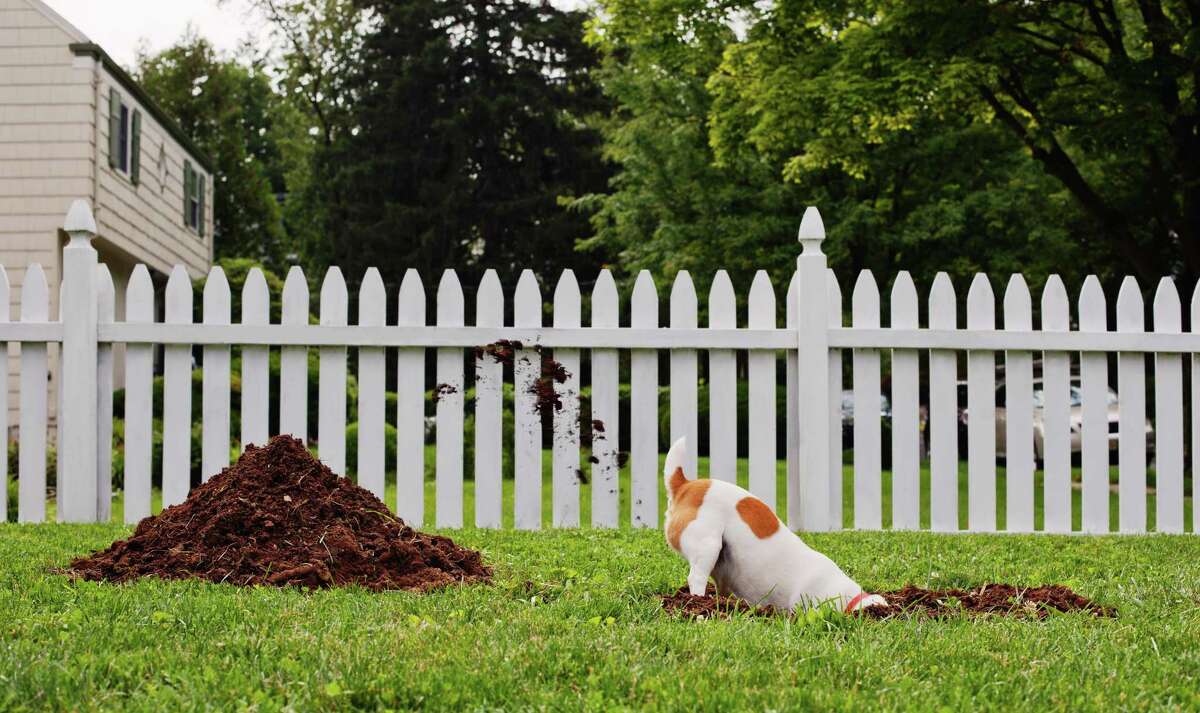
8 Ways to Stop your Dog from Digging your Lawn
Before digging spots become unattractive, it’s time to minimise, if not stop, your dog’s digging habit. Depending on the reason why your dog digs, there are several ways to address this:
1. Stop your dog from digging by placing obstacles and digging deterrents.
One of the simplest and easiest solutions to stop digging is to place obstacles or deterrents where your dog digs. This could include a pot of plant, chicken wire, flower beds, large rocks or a fence.
You could also add paving stones or plant bushes around the perimeter to make it a more appealing place.
An obstacle could force your dog to stop digging in that area of your lawn which in turn could give the grass some time to recover.
When adding an obstacle or deterrent, make sure that it also complements the surroundings so that your lawn will still look aesthetically pleasing.
You could experiment with different types of obstacles you can use and see which one works best in stopping your dog’s digging habit, while encouraging grass regrowth.
2. Stop your dog from digging by creating a digging zone.
A digging zone or digging pit is another possible solution to a dog’s digging problem.
Most dog digging problems are often difficult to control, so rather than stopping all digging, you could set up a dedicated place where it is okay for your dog to dig.
Find an area somewhere on your lawn where your dog could dig. Oftentimes, the best place is near the dog house. You could use wood or bricks to outline the digging zone so your dog understands that it is in the one place where it is okay to dig.
Fill the digging zone with loose and cool dirt or sand. To encourage your dog to play in the area, bury chew toys, bones and other treats at the surface level.
If you already installed a digging zone, it’s important to keep your dog interested in it. Make it an appealing place for digging by adding more things interesting to your dogs such as bones and new toys from time to time.
If your dog still digs in other areas of your lawn, bring its attention back to the digging zone by praising or giving rewards when digging occurs inside the pit.
3. Stop your dog from digging by providing an outdoor shady play area.
Some dog digging behaviour only happens during extreme temperatures, especially during the hot summertime. If your dog is digging to cool off during hot weather, consider building an outdoor play area. The location should be shady and not in direct sunlight to keep your dog cool any time of the day.
Make sure to add cool dirt and play equipment that will keep your dog busy. You could also add ramps, hills, a doggy see-saw and even a small pool!
With a play area in a shady location, you can minimise your dog’s digging, especially during extreme temperatures.
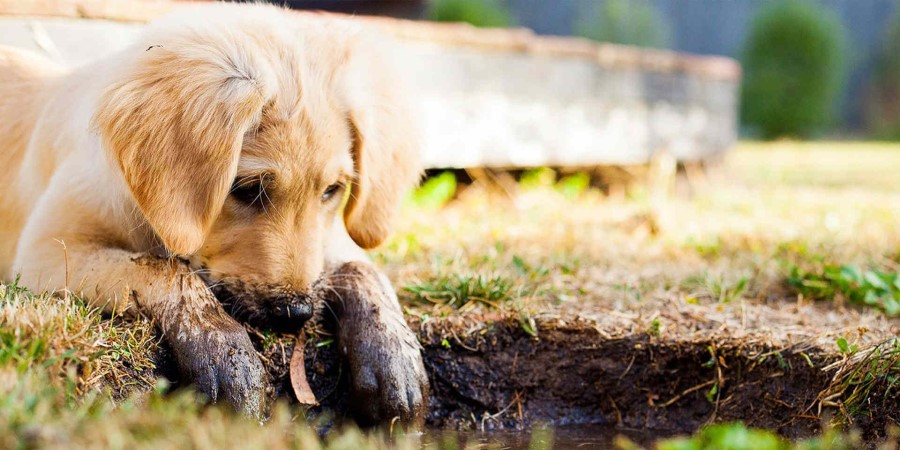
4. Stop your dog from digging by controlling the rodent population.
Another possible reason why your dog is digging is when it hunts for rodents and other animals because of their interesting smells or loud noises.
If your dog starts digging in your lawn, take that as a clue where these animals are possibly taking shelter.
Controlling rodents and other animals that thrive on your lawn may stop your fur baby from making dig spots.
Search for signs of burrowing animals then use humane and safe methods to control them, or make them leave your yard such as installing chicken wire. Don’t use toxic products that can harm your dog or other animals.
5. Stop your dog from digging by providing mental and physical stimulation.
Anxiety could also cause digging. It is common for dogs with separation anxiety to dig holes for mental stimulation, entertainment or to keep themselves busy.
They may also create a dog’s hole if they are left for long periods in the yard with no toys or playmates.
But it’s not only the anxious dogs that dig holes. Puppies and adolescent dogs that do not have outlets for their energy also tend to have digging behaviour.
Apart from anxiety, boredom is also one of the most common reasons why dogs dig holes. If you can’t stop your pet’s behaviour, at least you can minimise it by giving lots of love, attention and play.
Keep your fur babies active by taking them for regular walks and exercises. Here are some practical tips to keep your fur babies mentally and physically stimulated:
- Take your dog for a walk at least once a day. The lack of exercise can cause your dog to have behavioural issues, while a regular walk can promote behaviour modification.
- Promote physical and mental stimulation with active toys such as flying disks or balls as often as you can. Dogs love to play, and such activities are great for their overall health.
- Teach your dog new tricks and commands. You could also enrol your dog in a training class.
- Toys can greatly stimulate dogs and even aid in behaviour modification. Scatter some interesting toys in the area where your dog is allowed to dig. If you have a designated digging zone, you could place the toys there. Generally, a dog busy playing with his toys will forget about digging.
6. Stop your dog from digging by not allowing it to carry toys and treats outdoors.
In the previous tip, we mentioned placing chew toys and other treasures in the digging zone to stimulate your dog. However, this may not apply if the reason your dog is digging is to hide his treasures.
If you have a hunch that your dog takes its toys outside to bury them, stop it before it can even execute the plan. You can also follow these simple tips:
- In your home set an area where to store your dog’s toys but make sure it is accessible to your pet. Praise and reward your dog every time it brings a toy back.
- Don’t give too many toys or treats because the surplus is what causes some dogs to bury them. If your pet has a huge collection, you can give your pet access to one or two toys at a time.
- Put items that your dog already attempted to hide or bury. If your dog has a favourite toy that he already attempted to hide, give your pet access to it only under your supervision. This way you’ll know if he will attempt to dig again to hide the toy.
7. Stop your dog from digging by imposing rewards and/or punishment.
Rewards and punishment are also a good way to teach your pet what is considered good and bad behaviour.
Some dog owners attempt to stop their dogs from digging by punishing them such as by wetting them with a garden hose.
However, more often, punishments just cause some dogs to be more playful rather than stop what they are doing.
Talk with a professional dog trainer for advice on the best way to teach your dogs about good behaviours.
You can apply reward-based training, punishment-based training or a combination of both whichever works for your pet.
8. Stop your dog from digging by using lawn installations.
Sometimes, if everything else fails, the only way to stop your pet from messing up your lawn is by using lawn installations.
You can check out the following:
Turf reinforcement mesh
Your attempt to stop your pet from digging is oftentimes an uphill battle.
If none of the practical solutions work to stop your pet from digging, it’s time to think of a more permanent solution to protect your yard and prevent undisturbed earth from getting dug out.
One permanent solution in mind is to install turf reinforcement mesh to help the natural grass survive. It can be laid after installing your new lawn or it can also be added to your existing lawn.
There are different turf reinforcement meshes available, and the cost and installation process greatly varies.
If you are curious to know more about this product and how it is installed, check your local lawn service provider.
Temporary fence
A temporary fence or a chicken wire may also do the trick of stopping your dog from digging at a particular spot on your lawn.
This is especially useful if you are protecting an area where you have a vegetable garden and other plants.
With a temporary fence, you can stop the dog from accessing the affected area, thereby helping the grass and plants time to regrow.
Wear-resistant turf
Another trick to prevent your lawn from destruction when your dog likes to dig is to install wear-resistant turf.
There are different varieties of turf that fall under this category such as DNA Certified Sir Walter Buffalo grass.
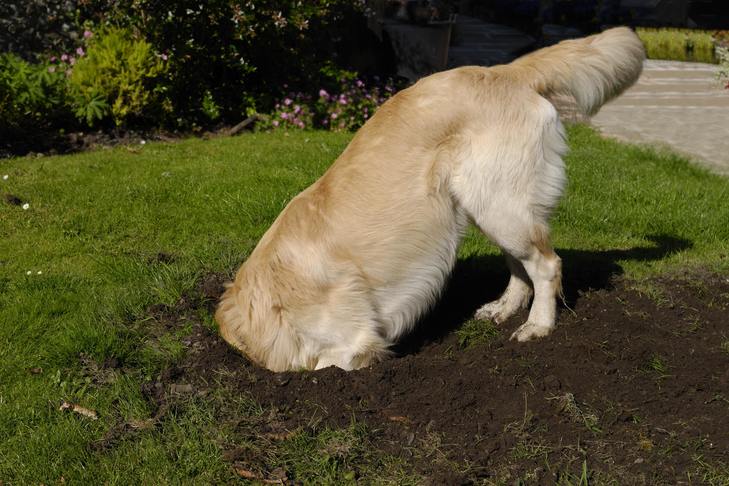
What NOT to Do When Stopping Your Dog from Digging
With the different solutions available to stop your pet from turning your lawn into a landmine, different dogs may also have different reactions to these solutions.
If your dog is a stubborn one, it may take time before you can see any improvement in the behaviour.
There are also breeds that are genetically predisposed to be headstrong and independent, and they are more prone to exhibit stubborn traits.
Whatever your dog’s reaction is to the solution you have, it’s important to remember that your ultimate goal is to develop trust and a loving bond between you and your dog so that your pet will also learn to respect and obey you.
You should avoid taking actions that can jeopardize the quality relationship that you have where your dog may start violently retaliating. To ensure this, take note of these important tips:
- Do not hit, yell or harm your dog out of anger.
- Do not use negative reinforcement like taking away your dog’s toy without offering something in return.
- Do not chase or make a fuss when you see your dog digging as your pet could easily misunderstand it as a game of chase.
Ways to Fix Dig Spots
While working on your dog to prevent it from digging again, you may need to start to fix existing holes in your lawn.
Step #1 – Fill in the gaps
For holes in the lawn, you need to fill them up with topsoil mix so that they will be levelled with the surrounding area.
You can use a garden shovel to slowly tap down soil until the holes are filled up. Once done, comb the area with a rake.
Step #2 – Level the soil
After filling in the gaps, try to keep the soil as level as possible and remove weeds, overgrowth and other debris in the surrounding area.
Step #3 – Returf bare patches
Once levelled, you can start to patch bare spots with new turf.
While wear-resistant grass with repair quickly, large bare spots can take a long time to recover.
Considering this, the best thing to do is install new grass over these areas.
Step #4 – Protect the new growth
While you are still fixing the area where your dog used to dig, make sure that your fur babies don’t have access to the area.
You could put a temporary fence or could also keep your dog inside the house the entire time unless you are there to supervise an outdoor play.
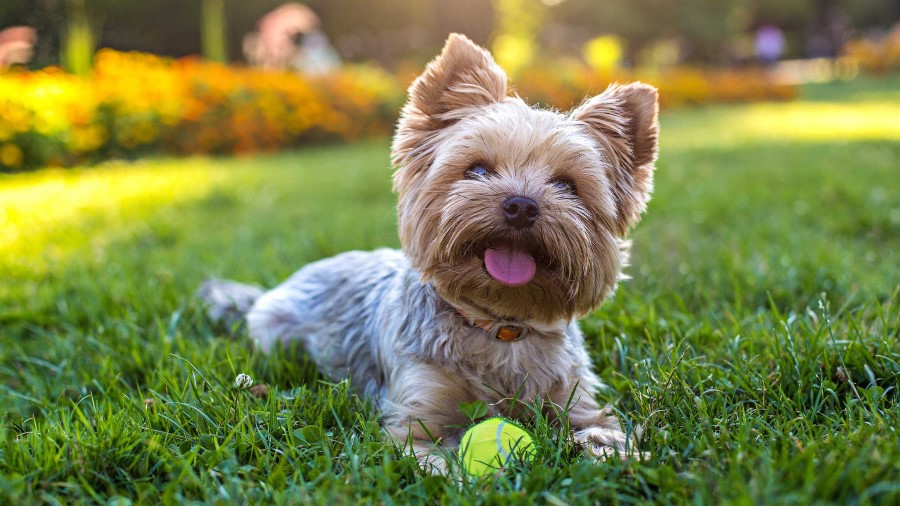
Frequently Asked Questions
Why is my dog digging up the lawn?
There are different reasons why your dog is digging up your lawn, including anxiety, boredom, entertainment, hiding things interesting to them, to cool off, or to play.
Digging is a common behaviour among dogs, and understanding the reason why your dog digs are important in minimising or preventing it.
Does vinegar stop dogs from digging?
Applying vinegar in the area of your lawn where your dog likes to dig may stop it from doing so because generally, these creatures do not like the smell of vinegar.
You could mix water and vinegar in a 1:1 ratio, put it in a spray bottle and apply it to the affected area. While this may work for some dogs, it may not work for others.
Do dogs grow out of digging?
Some dogs grow out of their digging behaviour, but this is not often the case. While there are dogs that stop digging when they grow older, others don’t.
This is especially true for dogs that are bred to dig such as terriers. For those dogs, digging usually continues until adulthood.
Is it okay to use cayenne pepper to stop dogs from making dig spots?
While cayenne pepper may not pose any harm when swallowed by your dog, it irritates the eyes. That is why it is not recommended to use cayenne pepper to stop a dog to dig.
What is a safe product to use to stop a dog from digging?
You could use safe products to prevent your pet from digging such as vinegar. There are other commercial products as well.
It’s important to note that what works for one dog may not work for your dog. It’s a good idea to check with your veterinarian beforehand on what is safe for your pet.
How to stop a dog from creating dig spots on your lawn?
There are different ways to stop or minimise your dog’s digging behaviour. However, it’s important to first understand what’s causing the behaviour before you should implement a solution.
Different factors that drive this behaviour have different solutions so make sure you know why your dog digs so that you’ll have an idea as to how to stop it.

read more!
recent posts
Which Zoysia Lawn is Right For Your Home?
Compare Zoysia Australis and Empire Zoysia to find the perfect turf for your lawn. Discover key differences and make an informed choice! Read more.
Sir Walter Buffalo vs TifTuf: Which One is Better
Compare Sir Walter Buffalo and TifTuf turf for Australian lawns. Discover key differences in shade tolerance, drought resistance, wear, maintenance & which is best for your yard.
Poolside Turf: Choosing and Maintaining Grass Around Pools
There’s nothing quite like stepping out of a swimming pool onto soft, lush grass. But when it comes to finding the best grass for around a pool, not all lawns are created equal. Chlorine pools, heavy foot traffic, and the unforgiving Australian sun can take a toll on...
Keeping Your Lawn Green and Healthy During the Summer Heat
Discover the best grass options for your lawn with our complete guide. Make informed choices for a lush, healthy yard. Read more to find your ideal grass!

Our Turf
TifTuf Bermuda
Buy Turf Online © 2019 All Rights Reserved. | Proudly Designed and Developed by Sydney ICT


